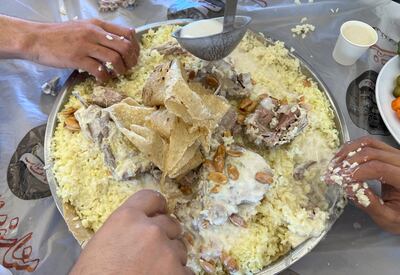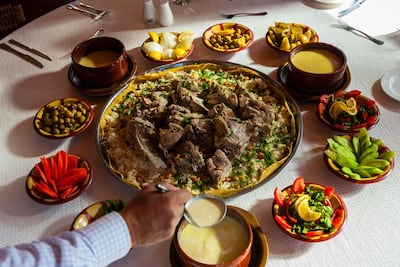A restaurant in Amman is offering its customers a space to enjoy a siesta after they eat mansaf, the Levantine dish considered the national dish of Jordan and a favourite of Queen Rania and her family.
Muab restaurant's “eat and lay down” philosophy means beds are made available for customers to take a nap after they eat the “heavy meal”.
Omar Mbaideen, the restaurant's co-owner, said the idea started as a joke, but is welcomed by customers because mansaf is full of rich ingredients that can induce sleep.
Abdullah, a visitor of the restaurant, said having a rest after eating mansaf is a must, especially for those – like him – who have to drive a long distance afterwards.
What is mansaf?

Mansaf is a dish made of sheep or goat meat cooked in fermented yoghurt sauce and served with rice.
In Jordan, it is more than just a meal – it is an important part of the country's national identify, a tangible link to its heritage and an essential presence at significant events or times of year, both celebratory and sorrowful.
Intended for sharing and communal eating, the dish is served on large trays or platters layered with paper-thin shrak bread followed by rice, meat and a tangy sauce. A sprinkling of roasted pine nuts and almonds provides a final flourish.
The intensely flavoured yoghurt-based sauce known as jameed, meaning hardened or dried, historically sets mansaf apart from other dishes.
Mansaf was listed on Unesco’s intangible cultural heritage list in 2022.
“Mansaf is a festive dish that is central to Jordan’s sociocultural events. An important and well-known symbol that evokes a deep sense of identity and social cohesion, it is associated with the agro-pastoral lifestyle in which meat and dairy are readily available,” Unesco said.

Agencies contributed to this report
